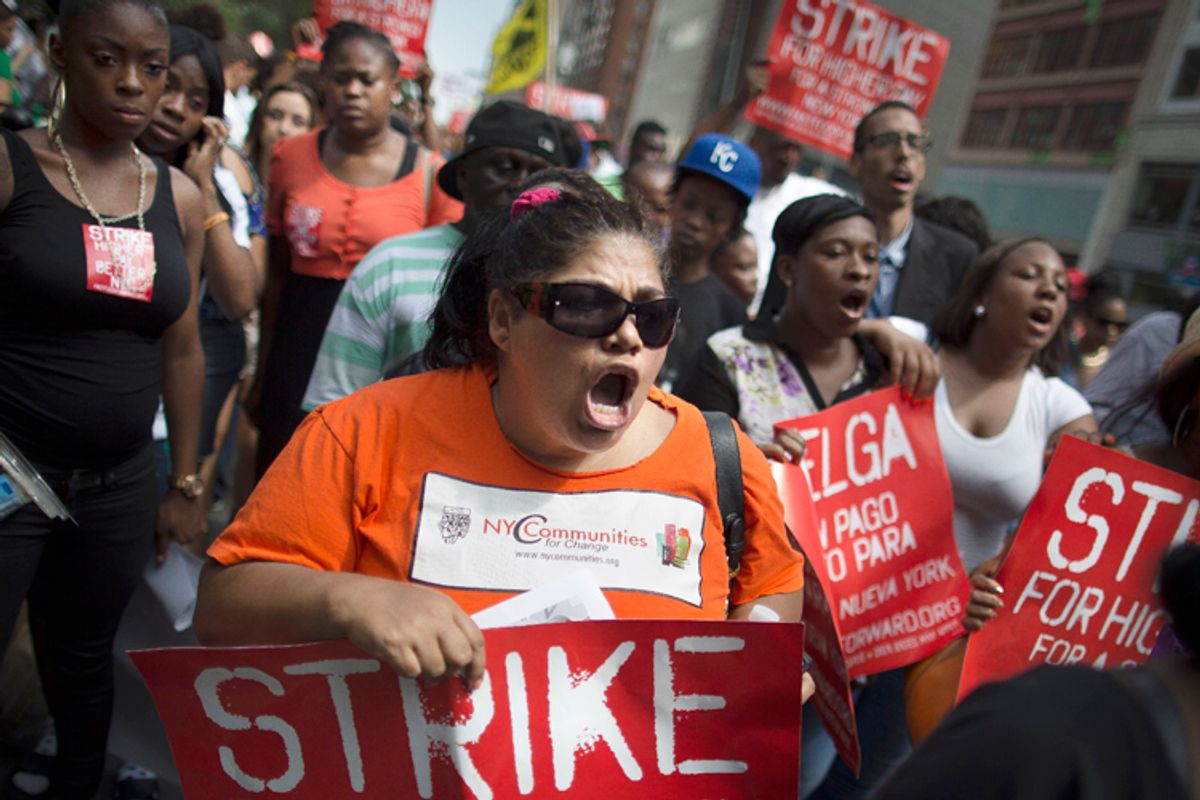On Wednesday, a fast-food worker named Terrence Wise introduced President Obama at the White House Summit on Worker Voice. Terrence spoke about his family’s struggle to scrape by on bottom-of-the-barrel wages despite working hard at multiple jobs. The Summit itself was also a reunion for he and his mother, also a fast-food worker. Because they don't make a living wage, neither Terrence nor his mother had been able to afford to travel across multiple states to see each other in ten years, a point not lost on the President. Terrence's story was no doubt all too familiar for the millions of Americans watching the promise of the middle class fade away in the face of growing income inequality.
But they haven’t lost hope. Workers like Terrence are on the frontlines of our nation’s fight to address income inequality and rebuild the middle class. From fast-food workers and pharmacists to reporters and adjunct professors, these workers envision a future where they will be able to support their families without relying on public assistance just to cover the basics. And if you ask them how we can achieve that vision, their answer is clear: unions.
Since fast-food workers first went on strike three years ago, workers have been sounding the call for higher pay and a seat at the table – and their voices just got a lot louder. A poll released last week by the National Employment Law Project (NELP) shows an overwhelming 72 percent of workers paid less than $15 an hour support unions.
The general public isn’t far behind. A recent Gallup poll found that support for unions had surged to 58 percent – an increase of five percentage points in the last year alone. And contrary to conventional wisdom, millennials have the highest rates of support. Meanwhile, economic experts like Former Treasury Secretary Larry Summers are increasingly identifying unions as critical to reducing income inequality and restoring the middle class.
It’s not hard to see why. Millions of Americans today rely on public assistance just to cover basic necessities like food, rent, and clothing for their kids – despite working full-time for some of the most profitable companies in the country. For these workers, joining together in a union is a time-tested path to the middle class. For taxpayers, fair pay and a voice on the job for underpaid workers means that we won’t have to make up the difference when major corporations like McDonald’s shortchange their employees.
While raising the minimum wage is an important step toward a stronger economy, it’s not enough. With families to support, workers see unions as a way to address their concerns with employers in real time. And our nation’s history teaches us that workers, the middle class, and our economy thrive when workers have a seat at the bargaining table. President Obama underscored this in his remarks last week when he noted that “as union membership has fallen, inequality has risen.”
Workers are looking for elected leaders who share their vision of a stronger economy – and, with the 2016 presidential race on the horizon, they’ve become a political force to be reckoned with. The recent NELP poll shows that 65 percent of underpaid workers who are registered to vote would choose a candidate who supports $15 and a union. The issues of fair pay and a voice on the job also have the potential to mobilize millions of unregistered voters: 69 percent of unregistered voters say they would register to vote if there were a candidate who supported $15 and a union.
Underpaid workers have made their priorities clear. With 42 percent of Americans now making less than $15 an hour, presidential candidates can’t afford to tune out their voices.
That’s not to say that the major corporations that employ many of these underpaid workers are off the hook. Companies like McDonald’s, the second largest private sector employer in the world, can and should step up to the plate. McDonald’s has been leading the race to the bottom, but it’s not too late to turn things around. By committing to fair wages and respecting workers' rights to join together for better conditions, McDonald’s has the opportunity – and the responsibility – to lead the way and get our economy back on track.
President Obama said yesterday, “We need to engage businesses to lead the way…because there are businesses out there who are taking the high road and enlist their employees as partners in their shared future, and understand that if they’re investing in their employees and making them partners, that they’ll actually do better, not worse. They’ll do better for shareholders. They’ll do better for the community. They’ll do better for America.” If McDonald’s led the way, it would mean a brighter future for the company. Recently McDonald’s revenue has suffered in part due to declining purchasing power among consumers and image problems related to the company’s labor practices. Setting a new industry standard could help the company solve both its problems – and pave the way to the middle class for millions of Americans.
Our country can’t solve income inequality and rebuild the economy overnight. Indeed, the Summit provided an opportunity to discuss numerous policy solutions to rebalance our economy and enable workers to have a collective voice again. And with commonsense solutions in hand and workers leading the way, there’s no doubt we can get the job done.


Shares